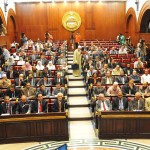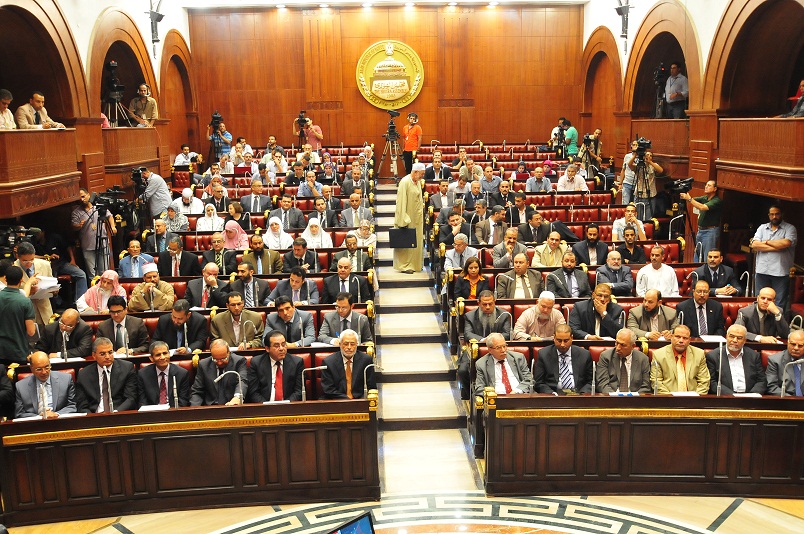
The Constituent Assembly tasked with drafting Egypt’s new constitution announced its specialised committees would continue to meet in Ramadan from Sundays through Wednesdays. The assembly at large will meet weekly on Tuesdays at noon.
The Basic Principles; Rights and Freedoms; System of Governance; and the Oversight and Regulatory Bodies committees are all scrambling to finalise their deliberations on various constitutional articles in order to hand them over to a newly-created drafting committee.
The drafting committee is tasked with ensuring the different committees’ conclusions are well written, concise and clear. It will start its work in the beginning of August, aiming to have the first draft ready by the end of Ramadan. “We want to write the constitution in a very clear and simple language so that the people would know their rights and obligations very well and so that school children would know it by heart leading to a new generation that knows and understands the freedoms afforded to it by the constitution,” Hossam El-Gheriany, chairman of the assembly who will also chair the drafting committee, told journalists.
The drafting committee led by El-Gheriany, a former judge and Chairman of the Cassation Court and Supreme Council of the Judiciary, will meet today for the first time. It is composed of constitutional expert Atef El-Banna, Ghad Al-Thawra Party leader Ayman Nour, former presidential candidate Amr Moussa, political science professor Manar El-Shorbagy, Al-Wasat Party leader Abou Elela Mady, Muslim Brotherhood member Sobhy Saleh, Azhar representatives Hassan El-Shafie and Mohamed Abdel Salam, and political analyst and assembly spokesperson Waheed Abdel Meguid. The committee also includes five members from outside of the assembly and a 20-member “support committee” of political science, constitutional, and legal experts.
According to Assembly Secretary General Amr Derag, six members, including two Shura Council members, of the assembly, have resigned. Replacement members will be elected in the general assembly meeting on Tuesday. Members of the Shura Council, the upper house of parliament, have resigned in a bid to strengthen the assembly’s position in the legal battle it is currently embroiled in.
The assembly currently faces a court case in the State Council’s Administrative Judiciary Court. The current assembly is the second version of a similarly formed body that was dissolved earlier.
Parliament elected the assembly and during its first incarnation reserved half of the seats for itself. The court ruled that parliament only had the right to elect the assembly’s members but that members of parliament could not be elected to it and thus the assembly was dissolved.
The second and current assembly also included members of parliament, only this time they were elected as representatives of various constituencies and not as MPs.
Since the Supreme Constitutional Court ruled the lower house of parliament, the People’s Assembly, unconstitutional and thus dissolved, members of that chamber of the assembly now face no obstacles. Shura Council members resigning from the assembly also strengthens its legal position. So does a bill the PA had drafted and passed before its dissolution that President Mohamed Morsy has now signed into law.
Assembly members are desperate to guard it from dissolution because a constitutional decree released by the Supreme Council of Armed Forces following the dissolution of the People’s Assembly gives it the right to appoint a third assembly if this one is dissolved.
SCAF representative on the assembly and Assistant Minister of Defence for Legal Affairs Major General Mamdouh Shahin has denied reports that he has asked for more powers to the military in the new constitution.
Assembly spokesperson Waheed Abdel Meguid told journalists last week Shahin submitted a proposal to the assembly from SCAF as to how the military and its powers should be written in the new constitution. Abdel Meguid added that the proposal included more powers for the military than those in the previous 1971 Constitution.
Shahin, however, denied that he had submitted such a proposal in statements he gave to the independent daily Al-Masry Al-Youm.
“It is too early for such talks now, we have yet to discuss the military in the System of Governance Committee,” Shahin told Al-Masry Al-Youm.
Recent efforts at a compromise regarding the second article of the constitution talking about Islamic Shari’a have become undone.
Initially, ultra-conservative Salafists wanted to remove the word “principles” from the article which currently reads: “Islam is the religion of the state, Arabic its official language and the principles of Islamic Shari’a are the main source of legislation” so that Shari’a law could be applied.
Liberal and secular parties wanted to keep the article as it is and received a major boost when Al-Azhar announced it was also in support of the current article.
The Salafists attempted to compromise by demanding that if the word “principles” were to remain, a clause would be added to the article saying that Al-Azhar would be the only body charged with interpreting said principles instead of the Supreme Constitutional Court.
The suggestion seemed like it would gain consensus but Grand Imam of Al-Azhar Ahmed El-Taib has asked the institution’s representatives in the assembly to reject it. He is insistent on the article remaining the way it is.
The Salafist Nour Party has since announced that if Article Two did not scratch the word “principles” or have a clause saying Al-Azhar interprets what these principles are, it would call on all its members and supporters to vote the new constitution down in the popular referendum it is set to go through.


